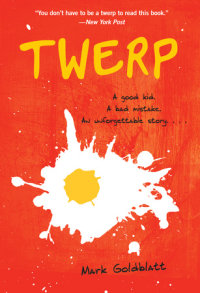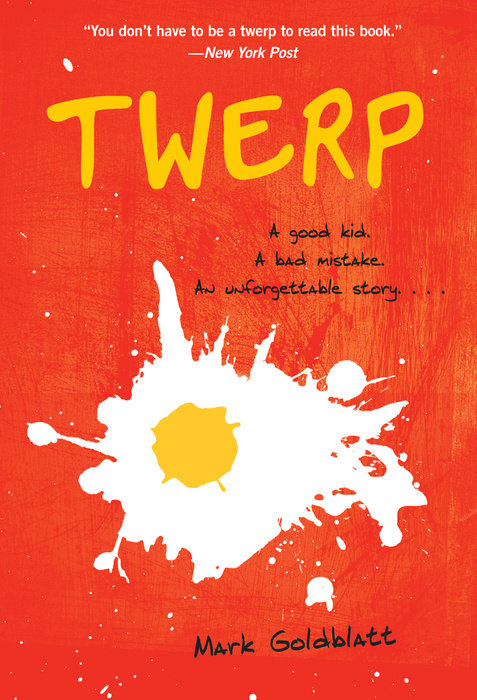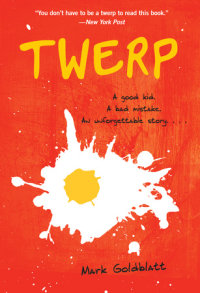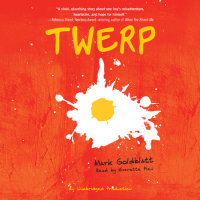Twerp
Twerp is a part of the Twerp Series collection.
It's not like I meant for him to get hurt. . . .
Julian Twerski isn't a bully. He's just made a big mistake. So when he returns to school after a weeklong suspension, his English teacher offers him a deal: if he keeps a journal and writes about the terrible incident that got him and his friends suspended, he can get out of writing a report on Shakespeare. Julian jumps at the chance. And so begins his account of life in sixth grade--blowing up homemade fireworks, writing a love letter for his best friend (with disastrous results), and worrying whether he's still the fastest kid in school. Lurking in the background, though, is the one story he can't bring himself to tell, the one story his teacher most wants to hear.
Inspired by Mark Goldblatt's own childhood growing up in 1960s Queens, Twerp shines with humor and heart. This remarkably powerful story will have readers laughing and crying right along with these flawed but unforgettable characters.
Praise for Twerp:
A Bankstreet Best Book of the Year
A Junior Library Guild Selection
A Summer Top Ten Kids’ Indie Next List Pick
A Sunshine State Award Finalist
“Reminiscent of The Perks of Being a Wallflower. . . . You don’t have to be a twerp to read this book.” —New York Post
“A vivid, absorbing story about one boy’s misadventure, heartache, and hope for himself.” —Rebecca Stead, Newbery Award-winning author of When You Reach Me
“Mark Goldblatt is an amazingly wonderful writer.” —Chris Grabenstein, New York Times bestselling author of Escape from Mr. Lemoncello’s Library
“[Fans of] Jeff Kinney’s Diary of a Wimpy Kid who have matured beyond the scope and gravity of that series will find a kindred spirit in Julian.” —School Library Journal
“Reminiscent of movies like The Sandlot. . . . Well-written and funny.” —The Advocate
“Alternately poignant and comical. . . . A thought-provoking exploration of bullying, personal integrity and self-acceptance.” —Kirkus Reviews
“A timely book.” —New York Journal of Books
“Elegant in its simplicity and accessibility.” —The Bulletin of the Center for Children’s Books
“An empathetic and authentic glimpse into the mind of a sixth-grade boy.” —The Florida Times-Union
“Funny, poignant, and an effective commentary on bullying and its consequences.” —The Horn Book Magazine
An Excerpt fromTwerp
Julian Twerski
January 11, 1969
The Pigeons of Ponzini
My English teacher, Mr. Selkirk, saysI have to write something, and it has to be long, on account of the thing that happened over winter recess--which, in my opinion, doesn't amount to much. It's not like I meant for Danley to get hurt, and I don't think that what happened was one hundred percent my fault, or even a lot my fault, even though I don't deny that I was there. So I guess I deserved to get suspended like the rest of them. I mean, maybe I could've stopped it. Maybe. But now the suspension is over, and Selkirk says I've got to write something, and because he says so, my dad says so, and that's that. I know what's going on. Selkirk thinks that if I write about what happened, I'll understand what happened. Which makes no sense, if you stop and think about it, because if I don't understand what happened, how can I write about it?
Besides, I've done worse, much worse, and never written a word about it, and the fact that I never wrote about it had no effect, good or bad, so writing about it or not writing about it isn't going to prove a thing. I've got a good handle on who I am, if I say so myself. Compared with most twelve-year-olds, I mean. I'm not saying that I'm done growing up. I know I've got a long way to go. Sixth grade isn't the end of the line. My dad says that when he looks back to when he was a kid, he doesn't know whether to laugh or cry. I know there's going to be a Julian Twerski in the future who's going to look back the same way and maybe shake his head. (That last sentence should make you happy, Mr. Selkirk.) But when I look back right now, I'm just saying that what happened with Danley Dimmel isn't the worst thing I've done.
I'll give you a perfect example: Last year, Lonnie and I were out back in Ponzini doing nothing, just yakking it up. Now, I guess I should mention that Lonnie's my best friend. Except calling him my best friend doesn't tell how tight we are. My dad says that if Lonnie told me to jump, I'd ask, "How high?" He's being sarcastic, my dad, but he's right in a way. Because here's the thing: Lonnie wouldn't tell me to jump unless he had a good reason. So, yeah, I'd ask, "How high?" He'd ask me "How high?" too if I told him to jump. It doesn't mean a thing. I've known Lonnie since I was two and he was three, and some of the stuff that's gone on between the two of us he'd brain me if I ever wrote about, but I'm sure he'll be all right with me writing about the thing with the bird.
Oh, and I should also mention that Ponzini is what we call the lot behind the old apartment building on Parsons Boulevard where Victor Ponzini lives. Why we started calling it Ponzini is another story, and it doesn't matter for the bird story. So let's just say that Lonnie was the first to call it that, and it caught on with the rest of us. But it fits. It looks like a Ponzini kind of place.
If you want to picture it, picture a layer of brown dirt on a layer of gray cement about the size of a basketball court. It's got weeds growing out of it, and it's got broken glass around the edges, and it's got a half-dozen rusted-out wrecks that were once parked in the underground garage but got pushed out back when their owners skipped town. It's got rats, which should go without saying, but the rats only come out at night. In other words, it's foul and useless, kind of like Victor Ponzini, who once squealed on Lonnie for cutting class. I mean, why is that Ponzini's business? The guy's a fifth grader and nothing but a tub of lard, but at least he knows it, which is about the only thing he's got going for himself.
So Lonnie and I were hanging out at the far end of Ponzini, just shooting the breeze, when I noticed that about a dozen pigeons had landed between two of the rusted-out wrecks. I nodded at the birds, and Lonnie glanced behind him, and I said, "What do you make of that?"
But in the time it took for the words to come out of my mouth, another half-dozen pigeons swooped down and landed. It was crazy--like a scene from that Alfred Hitchcock movie where a million birds get together and attack a town for no reason. There was no reason for them to show up in Ponzini either. There's not a thing for them to eat. I mean, it might make sense if someone had scattered bread crumbs for them. But there was nothing. It was as if one pigeon took it into its head that the far end of Ponzini would be a good place to rest for a minute, and then the entire air force joined in.
So the two of us were standing there watching, and in about a minute there were hundreds of pigeons crammed together between the two rusted-out wrecks, and the air was full of prrriiiilllrrrps--you know, that sound pigeons make. Their heads were bobbing up and down, ducking back and forth, and they were checking each other out. It was like a bird carnival. I'd never seen a thing like it.



